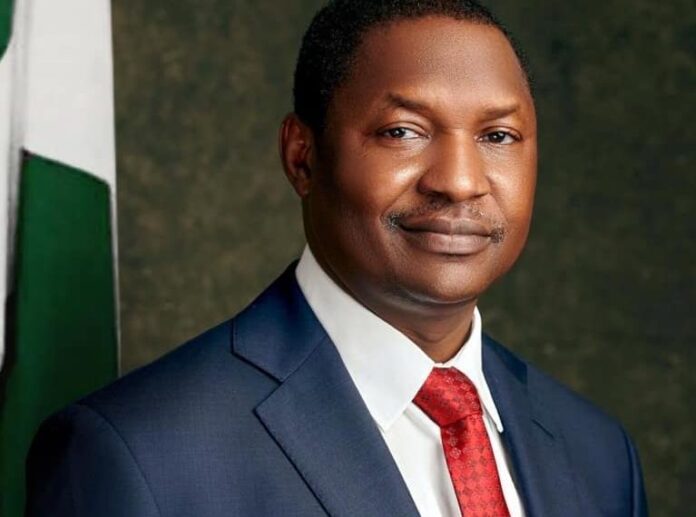The Federal Government would not adopt the policy of naming and shaming in disclosing the identities of identified suspected financiers of terrorism activities, the Attorney General of the Federation (AGF) and Minister of Justice, Abubakar Malami has said.
This, Malami said, was because the Federal Government acknowledges the constitutional right of such suspects to the presumption of innocence and would rather charge them to court for their identities to be made public in court.
The Federal Government has, for some months now, announced its arrest of some financiers of terrorism, among who it claimed, are bureau de change operators.
Malami said the Complex Case Group (CCDG) of the Department of Public Prosecution of the Federation (DPP) in the Federal Ministry of Justice has reviewed over 1000 boko haram case files out of which 285 have been charged before the Federal High Court based on prima facie cases of terrorism against them.
He explained that the prosecution of such cases was delayed because of the COVID-19 lock down, Judiciary Staff Union (JUSUN) strike and court vacation.
Malami, according to a statement by his Special Assistant on Media and Public Relations, Umar Gwandu, spoke while addressing journalists on the sideline of the ongoing 76th session of the United Nations General Assembly in New York.
Gwandu quoted Malami as saying: “Naming and shaming of suspects is not embarked upon as a policy by the federal Government out of sheer respect the constitutional rights of Nigerians relating to presumption of innocence.
“It is a product of constitutionalism and the law. It is rooted in the law and the names of the suspects will accordingly be made public at the point of judicial arraignment while the shaming remains a consequence of judicial conviction.
“Trials are judicial process and not about media sensations. Naming and shaming, in the Nigerian context, must be rooted in constitutionalism.
“We must strike a balance between constitutional presumption of innocence and evidential proof of reasonable ground for suspicion in making disclosures associated with terrorism funding and financing.
“Where reasonable grounds are established, suspects must be naturally taken to court at which point their identity must be disclosed and the naming become apparent.
“Shaming, on the other hand, is the product of conviction at which point the public are equally judicially put on noticed.
“In essence naming and shaming within the context of Nigerian law are judicial functions which commence with arraignment and terminate with convictions.
“Naming and shaming is not unguided and unregulated process. It is not like a discarded ship left at the mercy of winds and tides,” he said.
On efforts at addressing insecurity, Gwandu further quoted Malami as saying: “As far as terrorism funding and financing is concerned, we have succeeded in identifying those that are allegedly responsible for funding same and we are blocking the leakages associated with funding while embarking on aggressive investigation that is indeed impacting positively in terms of the fight against terrorism.
“The truth of the matter is that investigation is ongoing and advancing. For the purpose of investigation I would not like to be pre-emptive in terms of making disclosures that will have effect of undermining the successes we are recording,” Malami said.
“One thing I can tell you for sure is that whatever we do in terms of detention and arrest is indeed backed-up by judicial processes.
“We have acquired and obtained legitimate court orders taking into consideration the facts and material proof of evidence presented before the court on account of which the court eventually exercises its discretion in terms of granting orders that we can have the suspects in custody pending the conclusion of the investigation,” he said.






















